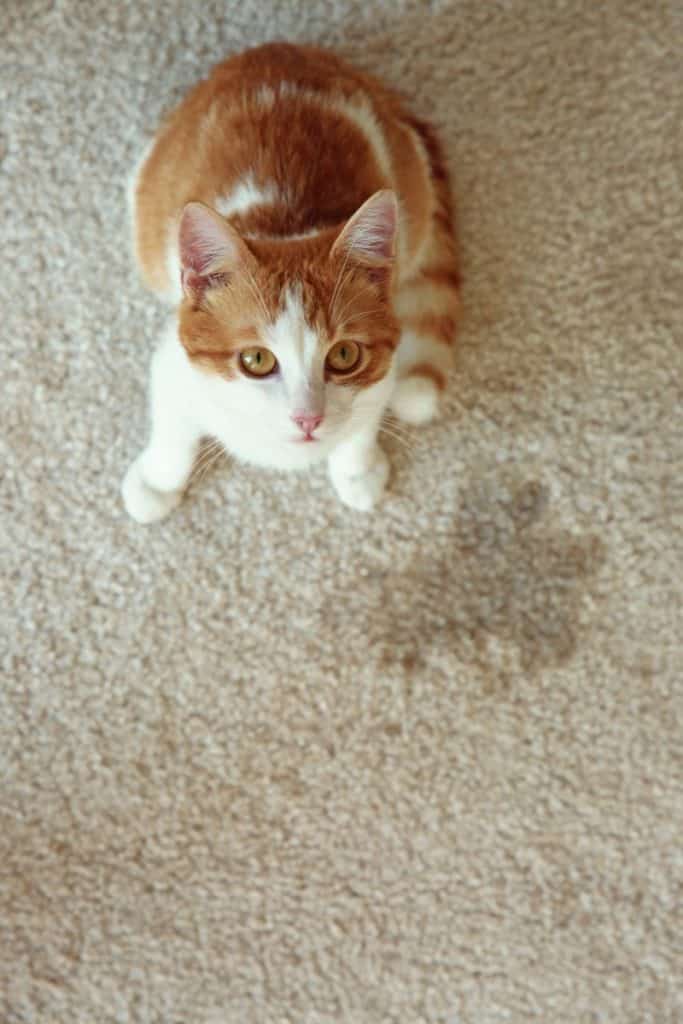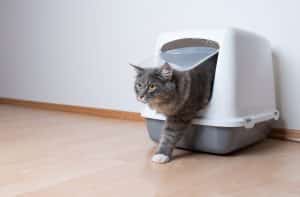Having a cat that urinates everywhere is problematic. The strong smell of cat urine tends to permeate fabrics, furniture and even floors. Cats are clean by nature. Generally, kittens learn very quickly to relieve themselves in the same place… But this is not always automatic. How do you stop a cat peeing on the sofa, the bed or on your clothes? Why does a cat that was clean pee everywhere? How do you teach a cat to be clean? In this article, we give you tips and solutions to stop your cat from urinating anywhere in the house.

Why does my cat urinate everywhere? Possible causes
Is your cat peeing out of its litter box? There must be a reason for this. Cats are naturally clean: when they pee out of their litter box, there is a problem. But what is it? Here are the most common causes.
A health problem
Uncleanliness is a sign of health concerns in cats, especially when it affects a cat that was previously clean. So don’t hesitate to talk to a veterinarian about your situation. It is possible that your cat suffers from kidney disease, urinary infections, arthrosis, diabetes… A little health check-up is necessary before blaming uncleanliness on a behavioural problem.
Territorial marking
A dirty cat can be easily distinguished from a cat that urinates to mark its territory. Indeed, dirty cats urinate on horizontal surfaces, squatting. A cat marking its territory, on the other hand, will wiggle its tail and send jets of urine on vertical surfaces. This behaviour is mainly present in males and can be suppressed by castration. Female cats may also mark their territory in this way, although this behaviour is less frequent. In this case, sterilization should also be considered. However, this intervention is not always effective: cats that are sterilized late tend to retain sexual and marking behaviour.
An unsuitable litter box
The litter tray and litter box must be suitable for your cat. If you have a kitten, make sure it has easy access to the litter tray. Ideally, the kitten should be placed in a quiet place away from her litter box. Cats don’t like to eat close to the place where they relieve themselves or where they rest. If you have several cats, provide one litter box per cat and an extra one. Cats are sometimes demanding when it comes to litter. Don’t hesitate to test several if your cat is not clean. Some cats, for example, hate scented or clumping litter. In this case, choose vegetable, silica or mineral litter. One last thing about this: cats are delicate and cannot tolerate defecating in a dirty litter box. So make sure your cat’s litter tray is perfectly clean by removing its faeces every day and cleaning the entire litter tray once a week.
Stress and annoyance
A cat that is clean and starts to urinate on the sofa or carpets overnight is a disturbed cat. Changes that may seem small to us can sometimes cause a lot of stress for felines. The most frequent causes of stress are the arrival of a kitten, a baby, new work schedules or a move. In any case, your cat does not urinate in the house to annoy you: he simply shows his discomfort. There’s no need to scold your cat or put your nose in her urine. That would only increase her stress and make her uncleanliness worse. Pay attention to your cat and be patient (after making sure that the cause of her uncleanliness is not elsewhere); everything should eventually be sorted out.
Habits
We don’t always know a cat’s past when we adopt it. It is possible that your cat has never urinated in a litter box, but outside. If you don’t have an outdoor litter box to offer, she simply doesn’t know where to urinate. If this is the case, you will have to change your cat’s living conditions or be patient in teaching her to be clean.
Premature weaning
Kittens learn cleanliness by observing and imitating their mother. A kitten taken from its mother too early may have a variety of behavioural concerns, including difficulty in being housetrained. Has your cat not received a good maternal education? You will have to teach her to relieve herself in the litter box yourself.
How do you teach a cat to be clean?
If your feline goes to the toilet in the house, you can put its excrement in the litter box. Similarly, if you catch him peeing everywhere, tell him not to pee firmly, put him in the litter box, pet him and leave him alone. Finally, you can encourage your cat to go to the toilet in the litter box by spraying a little bleach in the bottom of the tray. Cats like the smell of this product and will relish the opportunity to defecate where they smell it.
How can I prevent a cat from urinating out of the litter box ?
Stopping a cat peeing anywhere is more or less complex, depending on the cause of the uncleanliness. In general, it is a good idea to proceed by elimination as follows :
- Make a check-up of the animal’s state of health to exclude the medical cause ;
- Check that the environment is adapted to the cat (litter box at the right size, clean and well placed tray) ;
- Observe your cat for possible stress.
Is your cat urinating on your couch? In your shower? Some cats get into the habit of peeing in very specific places because they are attracted to certain surfaces. In this case, do not clean with bleach, but with white vinegar. If necessary, add a few drops of lavender lemon essential oil, natural cat urine repellents. Cats don’t like these smells, so they are perfect solutions to prevent a cat from always peeing in the same place. In addition, all these products are ideal for removing the smell of cat urine in the house.
Do you have a cat? A cat with a balanced diet is less likely to develop health concerns, including kidney and urinary problems. Discover our cat food:











